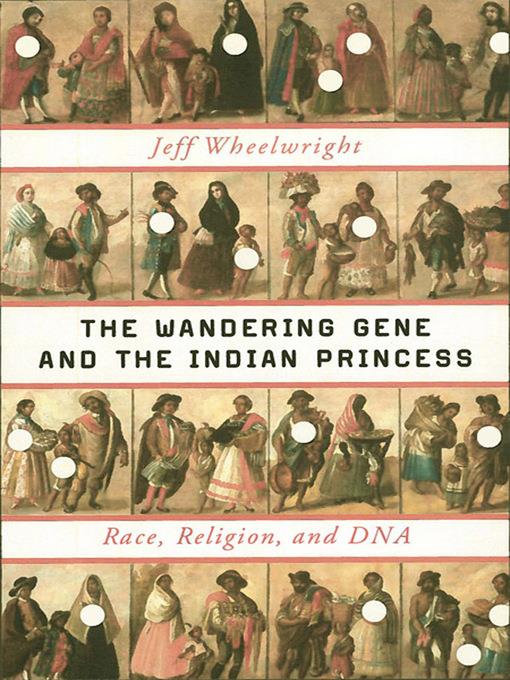
The Wandering Gene and the Indian Princess
Race, Religion, and DNA
کتاب های مرتبط
- اطلاعات
- نقد و بررسی
- دیدگاه کاربران
نقد و بررسی

October 10, 2011
From breast cancer to secret Jewish rituals, hidden links signify unlikely kinships in this meditative exploration of the science of racial connectedness. Wheelwright, a science journalist, tells the story of Shonnie Medina, a young Hispano woman in Colorado of mixed Indian and Spanish ancestry who died of breast cancer in 1999. She carried a genetic mutation, BRCA1.185delAG, with implications both scary (a high risk of aggressive breast and ovarian cancer) and intriguing, because geneticists consider the mutation a reliable marker of Jewish descent. Wheel-wright maps the mutation’s itinerary from the Babylonian Captivity in the sixth century B.C.E., when geneticists believe it first appeared, through the voyage of conversos—forced converts to Christianity—from Spain to the New World, where hints of Jewish practices persist among Hispano Catholics. But Wheelwright also ties Shonnie’s fate to culture and temperament: the apocalyptic expectations she drew from her Jehovah’s Witness faith; her vanity and feistiness, which led her to reject a mastectomy in favor of “alternative” treatments. (The author’s quiet indictment of New Age medical quackery is devastating.) Wheelwright pairs a clear exposition of the controversial sciences of genetic screening and ethnogeography with a sensitive account of how a modern identity is woven from ancient physical and spiritual strands. 10 illus.

November 1, 2011
A freewheeling trip through Southwestern culture and religion, Jewish history and modern genetics. In 2008, science writer Wheelwright reported in Smithsonian magazine on the discovery in Catholic Hispanos in New Mexico and Colorado of a genetic mutation, BRCA1.185delAG, that is characteristic of Jews. The mutation, whose designation indicates that the letters AG are missing at location 185 on the gene, causes the gene to fail at its task of suppressing cancer. The author tells the story of the discovery of its ancient origins more than 2,000 years ago among Hebrew tribes in the Middle East, the dispersion of the Jews to Europe, the enforced conversion of many Jews to Catholicism under the Spanish Inquisition and the arrival of Spaniards in the New World. Into this large picture, Wheelwright weaves the story of Shonnie Medina, a young Hispano woman who carried the mutation, and of her extended family, possible carriers of the gene. Medina was raised a Catholic but became a Jehovah's Witness, a fact that allows the author to weave another thread into his complex tapestry. Other important characters include: Jeff Shaw, a genetic counselor who worked with Medina's family; Dr. Harry Ostrer, head of the Human Genetics Program at NYU and author of a paper on DNA and Jewishness; Stanley Hordes, author of a book on the crypto-Jews of New Mexico whose research was supported by the discovery of the mutated gene; and Judith Neulander, an ethnographer who disputed Hordes' claims. The cast is large and the story covers millennia, but with Medina and her family at its center, it is still small and personal. An intriguing tale told with gusto.
(COPYRIGHT (2011) KIRKUS REVIEWS/NIELSEN BUSINESS MEDIA, INC. ALL RIGHTS RESERVED.)

November 15, 2011
Wheelwright (The Irritable Heart: The Medical Mystery of the Gulf War) introduces his readers to a newly identified cancer cluster among Hispanos, descendents of the original Spanish settlers of the American Southwest who arrived as early as 500 years ago. Shonnie Medina, a dark-haired Hispano beauty who looked like a storybook Indian princess, and her tragic early death from breast cancer is Wheelwright's focus. Through Shonnie and her family, Wheelwright explores Hispano religion and culture; their typical ancestral mix of European, African, and Native American DNA; and their surprising Jewish genetic links now attributed to conversos who left the Spanish Inquisition's horrors for the New World. Shonnie's ultimately futile quest for a cure for her cancer through natural healing is paralleled by geneticist Harry Ostrer's explorations of heritable diseases among Jewish populations and historian Stanley Hordes's controversial search for hidden Jewish links among New Mexico's Hispano population. VERDICT Wheelwright treats the Medina family with warm respect. His compelling narrative will enlighten his readers about the scientific and social dimensions of genetics and the ambiguous genetic links to race and ethnicity.--Kathy Arsenault, St. Petersburg, FL
Copyright 2011 Library Journal, LLC Used with permission.

Starred review from December 1, 2011
The heritable cancer-causing gene BRCA1.185delAG is at the hub of distinguished science writer Wheelwright's many-spoked history of race, religion, persecution, medicine, genetics, and one grieving Hispano (Spanish and Indian) family. Beautiful and ebullient Shonnie Medina died at 28 of breast cancer, a malady rampant among her relatives. Eight years after her death, it was discovered that the Medinas had inherited BRCA1.185delAG, a Jewish ancestral marker. Wheelwright's cogent, whorled inquiry into why the Medinas and other Latin Americans carry this mutation encompasses Jewish history, with a scientific emphasis on how events and culture shaped the Jewish genome, and a social study of the conversos, Jews who converted to Catholicism to save their lives during the Spanish Inquisition. Wheelwright also illuminates the history of the San Luis Valley, where Pueblos were converted by Spanish missionaries, and the Medinas left the harsh Catholicism of the penitentes to become Jehovah's Witnesses, a faith Wheelwright studies to understand Shonnie's fatal decision to forego medical treatment. With a novelist's gift for story and insight, an artist's appreciation for the stark beauty of the Southwest, and a passion for scientific investigation, Wheelwright addresses the thorny ethical, legal, and social implications of genetics and portrays a family bravely facing a tragic consequence of a long-hidden legacy.(Reprinted with permission of Booklist, copyright 2011, American Library Association.)

























دیدگاه کاربران